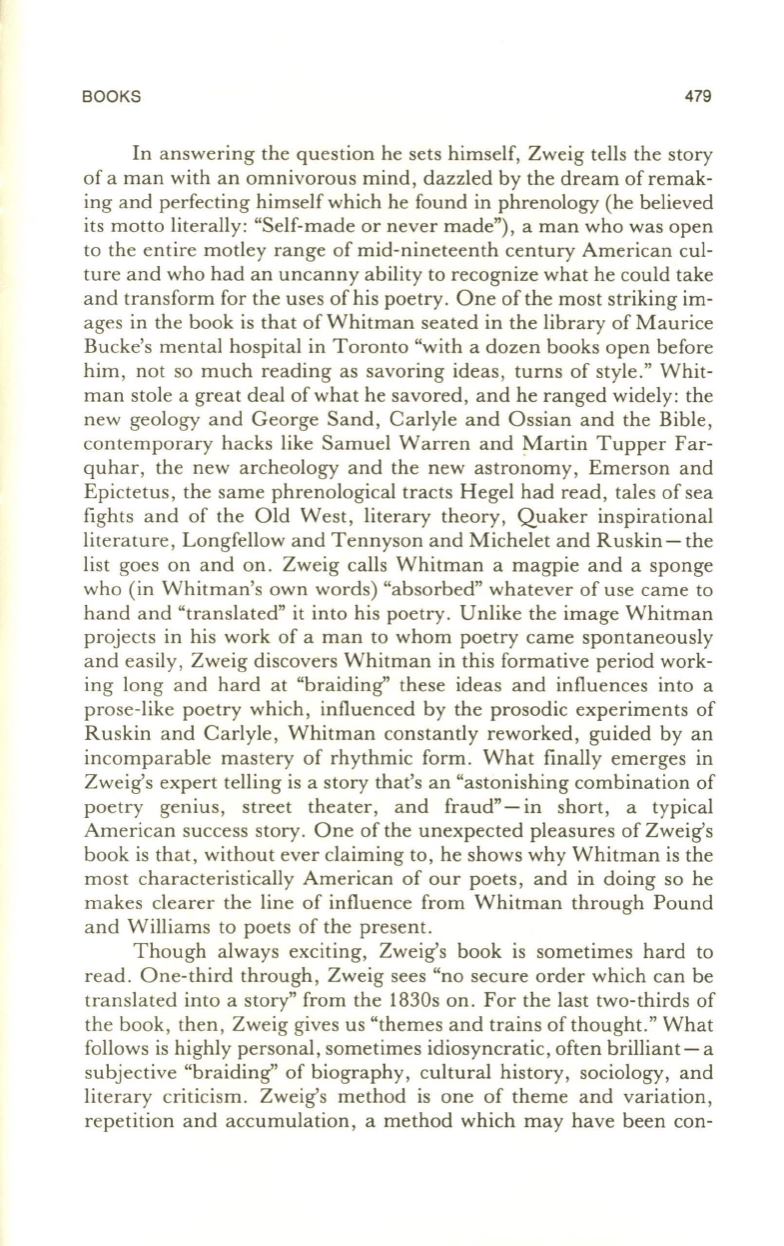
BOOKS
479
In answering the question he sets himself, Zweig tells the story
of a man with an omnivorous mind, dazzled by the dream of remak–
ing and perfecting himself which he found in phrenology (he believed
its motto literally: "Self-made or never made"), a man who was open
to the entire motley range of mid-nineteenth century American cul–
ture and who had an uncanny ability to recognize what he could take
and transform for the uses of his poetry. One of the most striking im–
ages in the book is that of Whitman seated in the library of Maurice
Bucke's mental hospital in Toronto "with a dozen books open before
him, not so much reading as savoring ideas, turns of style." Whit–
man stole a great deal of what he savored, and he ranged widely: the
new geology and George Sand, Carlyle and Ossian and the Bible,
contemporary hacks like Samuel Warren and Martin Tupper Far–
quhar, the new archeology and the new astronomy, Emerson and
Epictetus, the same phrenological tracts Hegel had read, tales of sea
fights and of the Old West, literary theory, Quaker inspirational
literature, Longfellow and Tennyson and Michelet and Ruskin - the
list goes on and on. Zweig calls Whitman a magpie and a sponge
who (in Whitman's own words) "absorbed" whatever of use came to
hand and "translated" it into his poetry. Unlike the image Whitman
projects in his work of a man to whom poetry came spontaneously
and easily, Zweig discovers Whitman in this formative period work–
ing long and hard at "braiding" these ideas and influences into a
prose-like poetry which, influenced by the prosodic experiments of
Ruskin and Carlyle, Whitman constantly reworked, guided by an
incomparable mastery of rhythmic form. What finally emerges in
Zweig's expert telling is a story that's an "astonishing combination of
poetry genius, street theater, and fraud" - in short, a typical
American success story. One of the unexpected pleasures of Zweig's
book is that, without ever claiming to, he shows why Whitman is the
most characteristically American of our poets, and in doing so he
makes clearer the line of influence from Whitman through Pound
and Williams to poets of the present.
Though always exciting, Zweig's book is sometimes hard to
read . One-third through, Zweig sees "no secure order which can be
translated into a story" from the 1830s on. For the last two-thirds of
the book, then, Zweig gives us "themes and trains of thought." What
follows is highly personal, sometimes idiosyncratic, often brilliant - a
subjective "braiding" of biography, cultural history, sociology, and
literary criticism. Zweig's method is one of theme and variation,
repetition and accumulation, a method which may have been con-


